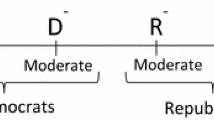Abstract
We analyze the effects of voter coordination on the equilibrium of voting games. Specifically, we analyze the concepts of strong equilibrium and coalition-proof equilibrium for plurality rule and runoff rule elections. We characterize these equilibria in the three candidate case, and provide results for important special cases in the general multicandidate case.
Similar content being viewed by others
References
Aumann R (1959) Acceptable points in general cooperative n-person games. Contributions to the theory of games IV. Princeton University Press, Princeton
Bernheim B, Peleg B, Whinston M (1987) Coalition-proof Nash equilibria I. concepts. J Econ Theory 42:1–12
Besley T, Coate S (1997) An economic model of representative democracy. Q J Econ 112:85–114
Dhillon A, Lockwood B (2004) When are plurality rule voting games dominance solvable?. Games Econ Behav 46:55–75
Farquharson R (1969) Theory of voting. Yale University Press, New Haven
Feddersen T (1992) A voting model implying Duvergers law and positive turnout. Am J Polit Sci 36:938–962
Feddersen T (1993) Coalition-proof Nash equilibria in a model of costly voting under plurality rule. Mimeo
Mas-Colell A, Whinston M, Green J (1995) Microeconomic theory. Oxford University Press, New York
Messner M, Polborn M (2004) Miscounts, Duverger’s Law and Duverger’s Hypothesis. Mimeo, Bocconi University, University of Illinois
Moulin H (1979) Dominance solvable voting schemes. Econometrica 47:1337–1351
Niemi RG, Frank A (1981) Sophisticated voting under the plurality procedure. In: Ordeshook P, Shepsle K (eds) Political equilibrium. Kluwer, Boston
Niou E (2001) Strategic voting under plurality and runoff rules. J Theor Politics 13:209–227
Osborne MJ, Slivinski A (1996) A model of political competition with citizen-candidates. Q J Econ 111(1):65–96
Palfrey T (1989) A mathematical proof of Duverger’s law. In: Ordeshook P (ed) Models of strategic choice in politics. University of Michigan Press, Ann Arbor, pp 69–91
Author information
Authors and Affiliations
Corresponding author
Rights and permissions
About this article
Cite this article
Messner, M., Polborn, M.K. Strong and coalition-proof political equilibria under plurality and runoff rule. Int J Game Theory 35, 287–314 (2007). https://doi.org/10.1007/s00182-006-0048-z
Revised:
Published:
Issue Date:
DOI: https://doi.org/10.1007/s00182-006-0048-z




